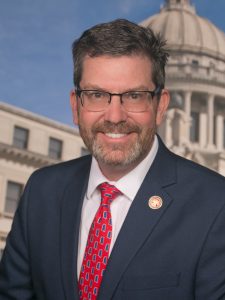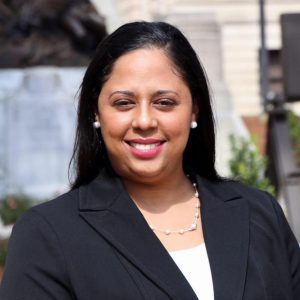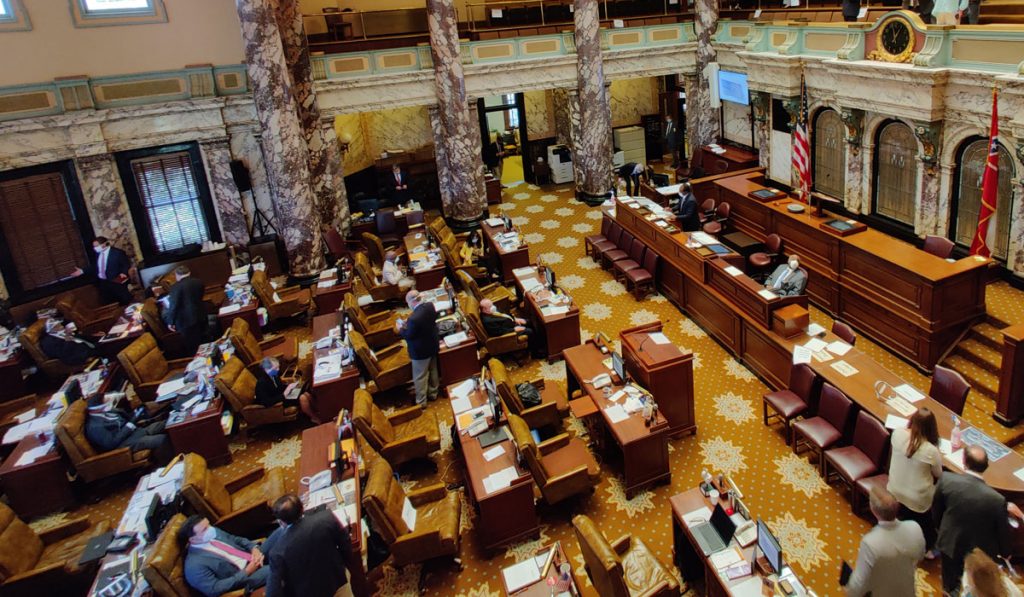The Mississippi Legislature’s efforts to introduce new purges of registered voters have run out of time in 2021, a casualty of a tighter session than 2020’s sprawling affair and, perhaps, a cross-chamber boxing match over the looming income-tax bill.
Both of the key voter-purge bills died as the final committee deadline expired Wednesday night. Elections Committee Chairman Sen. Jeff Tate, R-Meridian, authored Senate Bill 2588, which would have required county election officials to begin the process of revoking the registration of voters after they miss two years of voting by sending a postcard to their home addresses.
Missing the postcard and not voting in the following two elections would have sufficed for an automatic purge under Tate’s proposal.
‘Paralyzed With No Action’
Rep. Dan Eubanks, R-Walls, introduced the second piece of legislation, House Bill 586, which would have directed the Statewide Elections Management System to check unspecified “identification databases” for registered non-citizens. Voters the database check flagged as potential non-citizens would have faced an immediate and stiff challenge to their registrations.
The legislation, if it had succeeded, would have mandated a 30-day period in which flagged voters would have had to provide a birth certificate, passport or naturalization documents to the relevant authority. Failure to comply with those requirements would result in an immediate voter purge.

Eubanks defended the bill in an interview with the Mississippi Free Press today, asserting that required documents did not represent an undue burden on registered voters. “There’s a fear that people have that you’re going to disenfranchise somebody. And it’s a healthy fear,” he said. “You don’t want to disenfranchise people … but at some point you carry those concerns to the point where you wind up paralyzed with no action.”
Eubanks argues that measures like H.B. 586 are necessary to restore faith in the electoral process he says is sorely lacking in the U.S. “If you have no faith in your system, how can you have faith in your leaders?” he said.
Rep. Zakiya Summers, D-Jackson, argues the opposite. She told the Mississippi Free Press after that bill’s passage in the House that it represented an unnecessary attack on Mississippi voters, threatening marginalized communities with costly, time-consuming barriers to the vote.
“What you’re doing is paying to prove that you’re a citizen, so you can vote … that comes out to be a poll tax,” Summers said.
Today, Summers’ only positive impression of the bills was that they were dead. “I am absolutely thrilled that those pieces of legislation died,” she said.
“The consequences of (HB 586) would have been a major toll on elections officials,” she said. “… It would’ve opened the door for litigation. The evidence listed in the bill was ambiguous. We didn’t even know what agency they planned to use to target individuals.” She added that she firmly believed the affected voters would have been Black and Brown.
‘I’m Glad They’re Dead’
Sen. David Blount, D-Jackson, who previously spoke out against the voter-purge efforts, responded briskly to their demise. “They were both bad bills,” he told the Mississippi Free Press in an interview. “I’m glad they’re dead.”
Secretary of State Michael Watson took a distinctly different view, lamenting to conservative blog Y’all Politics that the death of these bills was harmful to “vote integrity,” before advancing unsubstantiated theories of leftist voter fraud.

“What (the left) really love is … so many of our counties showing these registered voters on the voter rolls who were either dead or no longer live there. Our worst seven counties (have) over 100% of their voting-age population showing up on the registered voter rolls. That’s what they celebrate,” Watson said, before unveiling details of what he believes to get the left’s sinister plan.
“That’s when they come in and say, you know, we need universal mail-in ballots, because all those mailboxes are going to receive ballots, and folks down the street know that people don’t live there anymore: they can come and get those ballots and vote for them. Those are the things that the left wants to advance, and that’s exactly what we want to stop,” Watson told the blog.
A Back Door for Citizenship Checks
Eubanks explained a more mundane purpose for the bill: to address ongoing litigation facing the secretary of state over the requirement to show proof of citizenship upon registering to vote.
“What the bill effectively did was change how the state verified new registered voters. It would check everybody on the back side,” Eubanks said. If HB 586 had passed, it would have invalidated the litigation, providing a back door for citizenship checks after registration, rather than before.
Summers explained that she had no problem with regular voter-roll cleanup, especially for counties with bloated voter rolls, but instead advanced an expansive image of legislative input into voter rights.
“Surely, we should go through the process of cleaning those voter rolls … but let’s not make this a partisan issue,” she said. “Let’s talk about what Mississippi wants to do. Voters do want early voting. They want to be able to register online. They don’t want to have to stand in line for hours on end because of the cumbersome absentee voting process that we have right now.”
Summers highlighted the Electronic Registration Information Center, or ERIC, as a more effective way to clean voter rolls up. ERIC is a digital voter information-sharing system currently in use in just over half the U.S.
“It’s a proven way to do accurate and effective voter roll maintenance. (Because) the biggest issue is the voters who are moving,” Summers said. ERIC would address this challenge through checking in other member states for moving voters, quickly removing them from the rolls in their former precincts.
Watson: ‘Politics Being Played’
Sen. Blount could only speculate on what spelled doom for the voter-purge efforts. “I don’t know if it’s a time issue, or some of the other larger fights that are happening between the House and Senate—or because many of us expressed, very vocally, our serious opposition to the bill,” he said.
Summers credited bipartisan communication and pressure from activists for averting the bills’ passage, explaining the significant effort on the part of the Democratic Caucus to convince leadership to let the bills expire.
Watson speculated to Y’all Politics that leadership may have taken an issue with the bill, based on how it was referred in the Senate. Referrals to certain committees are often a quiet way for chamber leadership to kill bills.
“In the House … look, I understand there’s politics being played with the tax bill, and folks are mad at each other, I get it,” Watson told the blog. “But this is a common-sense piece of legislation.”
Eubanks agreed. “I think it’s sad. It’s a casualty of the war that’s going on right now between the Senate and the House,” the sponsor said.









